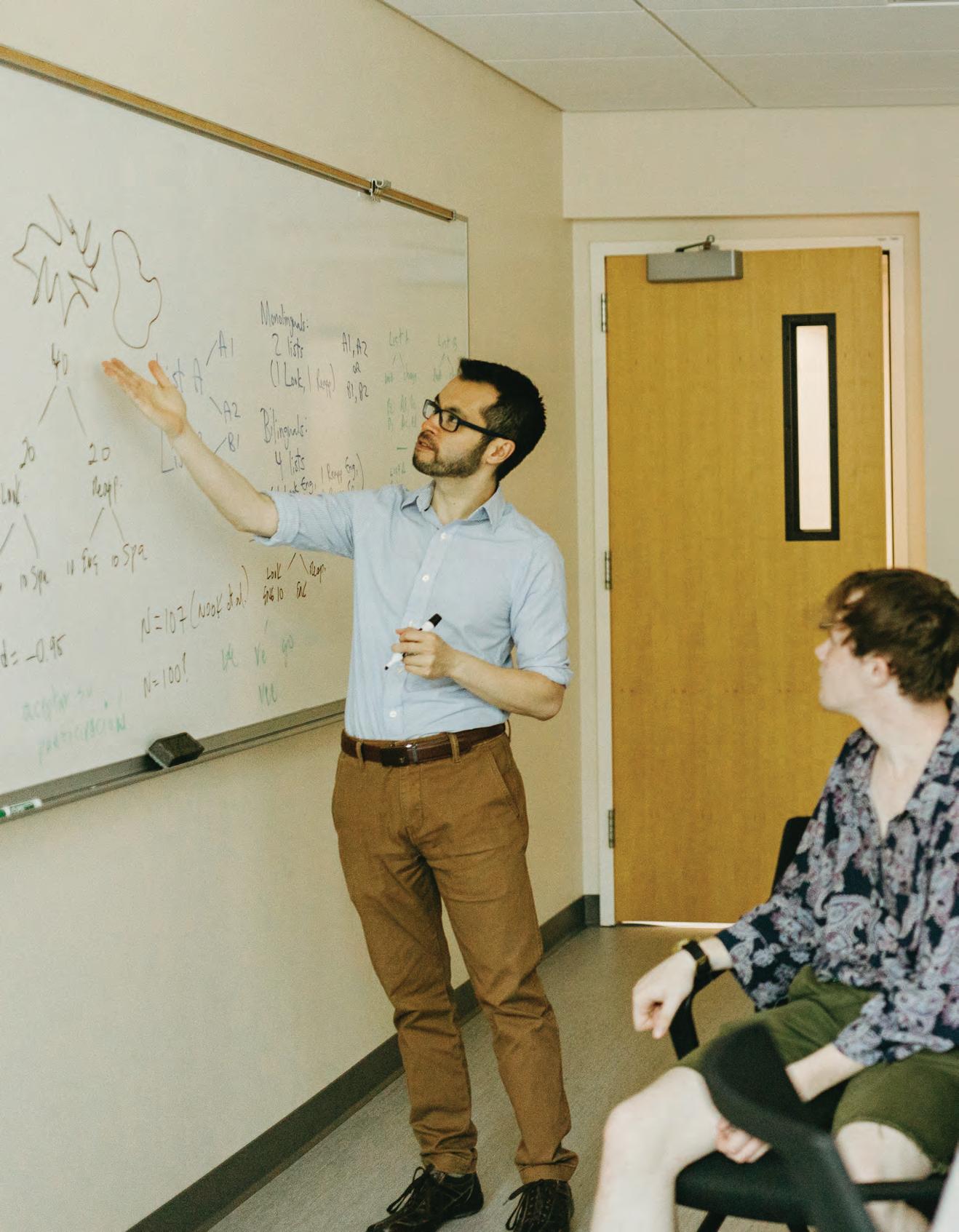
13 minute read
Eliot Circular
news from campus
The Sound of Summer Research
Psychology students Emerson Schimmel ’24, Lena Kassin ’24, Andries Castellano ’25, Tony Shan ’23, and Clarissa Madar ’23 spent the summer exploring the relationship between language and thought in research projects they undertook with psychology faculty Prof. Kevin Holmes and Enriqueta CansecoGonzalez. The students’ individual (and in some cases collaborative) projects included studying people’s impressions of their “inner voice”; examining how words support emotion regulation; and investigating how grammar shapes judgments about math ability.
Here Prof. Holmes, Emerson, Lena, and Andries discuss a language phenomenon known as the bouba-kiki effect—when shown a spiky shape and a round shape and asked which one is a “bouba” and which one is a “kiki,” people from diverse cultures and languages uniformly say the round one is a bouba and the spiky one is a kiki, illustrating the existence of sound symbolism in language.
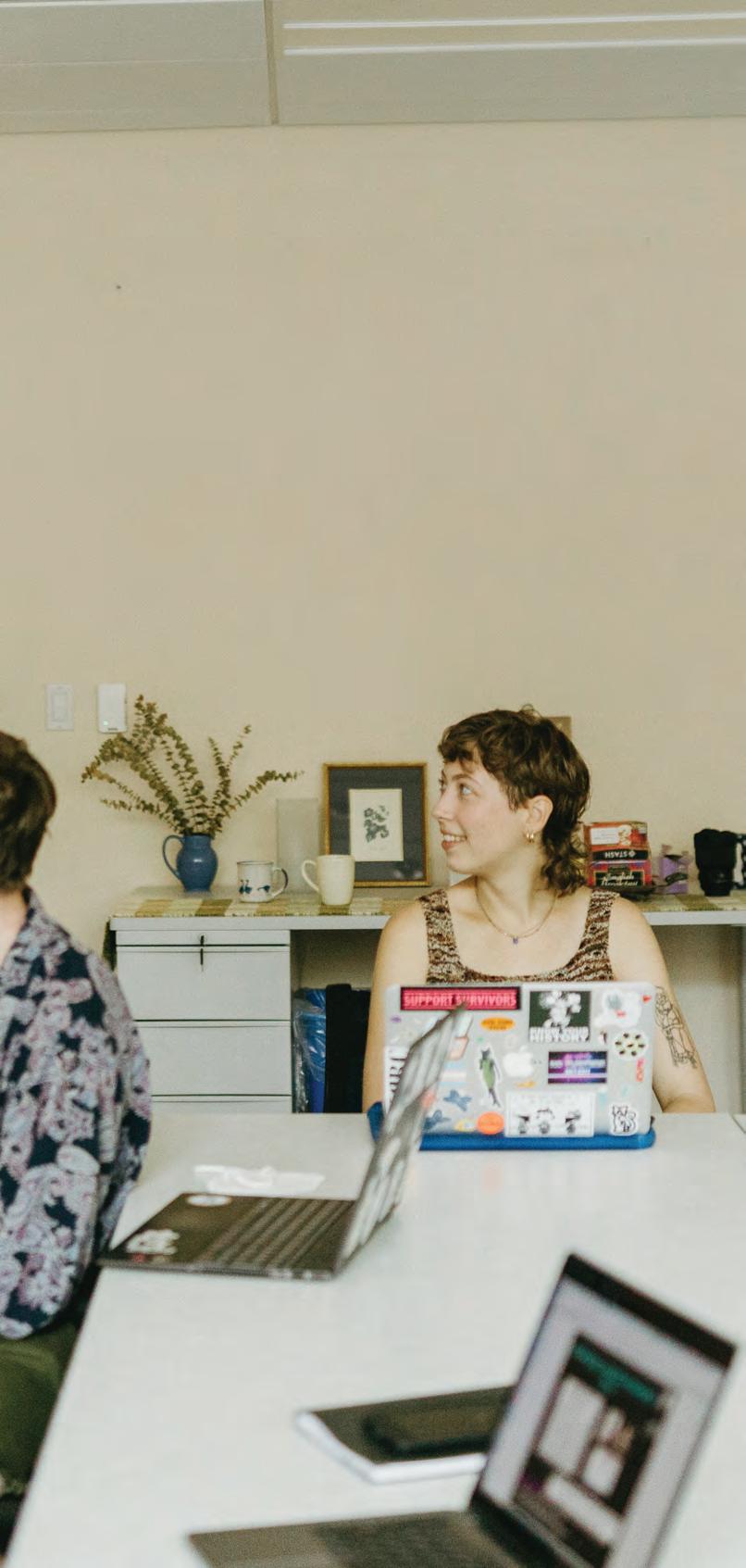
photo by lauren labarre Donors help Reed students succeed in the new normal
Nearly 5,000 alumni, parents, staff, and friends mobilized to support Reed, giving over $4.8 million to the Annual Fund this past year, ensuring the college could stay true to its mission, even as it navigated stubbornly uncertain times.
“We’re impressed (but not surprised) at how our alumni community has stepped up to help current students,” says Alumni Fundraising for Reed cochair Cori Savaiano ’11.
The Annual Fund supports Reed’s academic program and student experience—everything from scientific equipment in the labs to books and journals in the library to financial aid. Last year, the college awarded a record $38.2 million in financial aid, a 25% increase from the previous year. Reed is one of only a few colleges to meet 100% of demonstrated financial need for all four years of a student’s education. A commitment of this kind, especially during the ongoing tumult caused by the pandemic, is only possible with the extraordinary commitment of Reed donors. “It might be a little cliché,” says Kyndra Kennedy ’04, “but the fact remains that when everybody chips in a little bit, it adds up to having a big impact on the college we love.”
In addition to gifts to the Annual Fund, alumni, parents, staff, and friends made significant contributions to the general endowment and created permanent funds in support of the financial aid program, the Calligraphy Initiative, the Center for Life Beyond Reed, the Center for Teaching and Learning, student research, and the data sciences program, among other initiatives.
Loline Hathaway ’59 established a Student Emergency Fund endowment. “I had an emergency when I was a student,” she said. “Money was really tight and I don’t know how I got through it. So I have empathy for somebody that gets sick or has to go home. That could happen to anybody and 18-year-olds don’t tend to have emergency funds. I thought, ‘That’s something I can do.’’’
With financial support at all levels, donors helped the community to navigate a new normal last year while continuing to make bold plans for the college’s future. Come what may.
Artwork by Prof. Ondrizek (center) and works by alumni artists in Transitions and Transformations: The Constant Flux of Our Personal Structures, an exhibit on display in Venice.
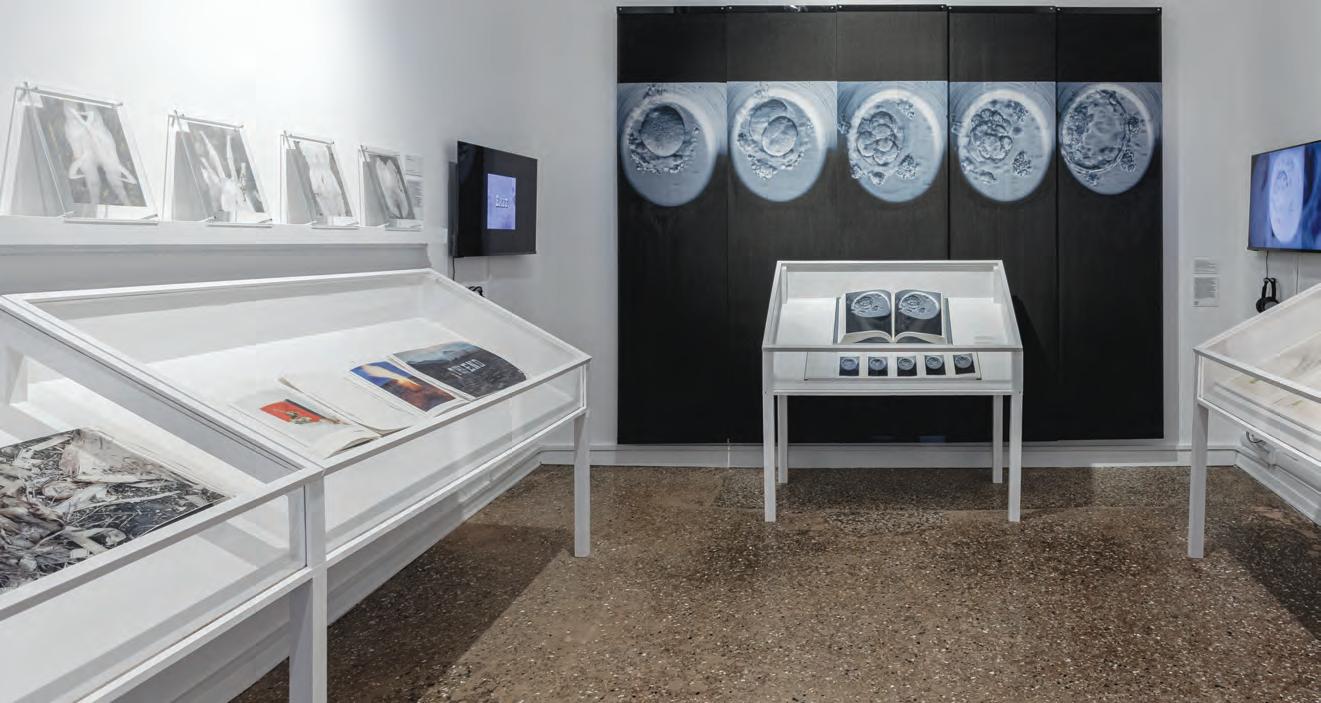
Change Agents
Like any Reed professor, Prof. Geraldine Ondrizek [art 1994] is a teacher-scholar. So, when the European Cultural Centre (ECC), an international cultural exchange promoting contemporary art, approached Ondrizek about exhibiting her artwork in a biennial exhibition, she countered: exhibit her artwork, along with the work of her former students.
The exhibit, titled Transitions and Transformations: The Constant Flux of Our Personal Structures, explores how environmental factors, such as climate change, environmental degradation, and social-political factors—such as forced immigration, homelessness, and political instability—impact all living organisms biologically and genetically. “These works show not only difficult situations, but emphasize the metamorphosis and the resilience of living organisms and ecosystems,” Ondrizek writes in the exhibition catalog.
The artworks of Reed’s art alumni would be perfect candidates to exhibit, Ondrizek thought. “I encourage them to make work that has social, political, and personal meaning,” she says. She calls her recent students “change agents” who often combine their artistic practice with activism, social justice, and political engagement.
Ondrizek was successful. The exhibit, which opened on April 23 and runs concurrently with the famed Venice Biennale, showcases the artwork of Ondrizek, Visiting Professor Barbara Tetenbaum [art], and eight Reed alumni.
The exhibit emphasizes the long-held ability for fine art to be a mechanism for political and social activism. Ondrizek’s art explores the first 100 hours of in vitro fertilization via artist books made of bamboo paper and silk binding, as well as silk panels and a film. The exhibit of Stephanie Gervais ’09, Badr, tells the story of a South Sudanese man living in a refugee camp with a quilt embroidered with Arabic writing telling his story, combined with a sound recording of him speaking. Photo transfers, accented with gold leaf, portray the gender transition of M. Prull’s ’19. Films showcase alumni artwork that could not be on-site, including the large banners by Paulina Joy Poleyumptewa ’21, displayed in Portland, Oregon, in spring 2021, exploring the concept of Indigenous identity and criticizing colonialism, and five films, the genres of which including documentary, telenovela, and drama, made by homeless youth and produced by Nili Yosha ’07 that portray daily life of homeless youth in Portland.Yosha is the executive director of Outside the Frame, a Portland-based nonprofit that teaches homeless youth photography and documentary film skills. Ondrizek “could have had the whole gallery to herself,” Yosha said. “But she invited her students to participate with her. I, in turn, presented my students’ work.” An artist herself, she said her students’ films are “the best of my work.”
Transitions and Transformations is a complex and nontraditional show, but the exhibit’s design mimics the artwork’s themes, which reveal that “we are extraordinarily vulnerable,” Ondrizek said. “We have to realize that transformation is going to happen, whether we like it or not.”
While the ECC curator Lucia Pedrana’s selection of Ondrizek’s work was a driving force of the exhibit, numerous ties to the Reed community made it possible. Paid with grants and sponsorships, including the Oregon Arts Commission and the Ford family Foundation, the exhibit was additionally funded by Norman Packard ’76 and his wife, Grazia Peduzi, who contributed to sponsor three artists in the show who exhibit through their nonprofit, The Emergent Art Space. Transformations and Transitions is the sixth edition of “Personal Structures,” which the
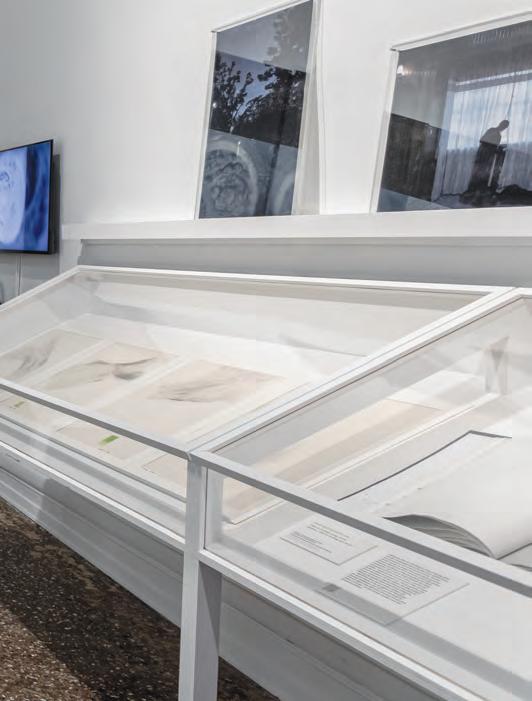
Andrea Ferro Photography
ECC organizes biennially. The exhibit runs concurrently with the Venice Biennale, the world’s largest international and most prestigious art exhibit . This Biennale is historic: for the first time in history, a woman curated the show, and more than half of participating artists identify as women and people of color. Dr. Jane Chin Davidson ’01, a former student of Ondrizek’s, will moderate a symposium on Transitions and Transformations in Venice on September 22, with the alumni artists participating in person and via Zoom. “We get an opportunity to delve into these narratives,” Davidson said, including “a different potentiality” around climate change, political instability, and social upheaval. “That is what art’s potentiality is—to imagine and break out of those boxes.”
The exhibit closes on November 27, and Ondrizek hopes the show will come to Reed in
August of 2023. —AMANDA WALDROUPE ’06
Alumni participants:
Stephanie Gervais ’09, Greta Fieweger ’21, Paulina Joy Poleyumptewa ’21, M. Prull ’19, Ethan Rafal ’07, Lila Roo Duncombe-Lieber ’08, and Nili Yosha ’07. Ondrizek’s research associates include Genevieve G. Tremblay and Fernanda X. Oyarzun, marine biologist from Chile.
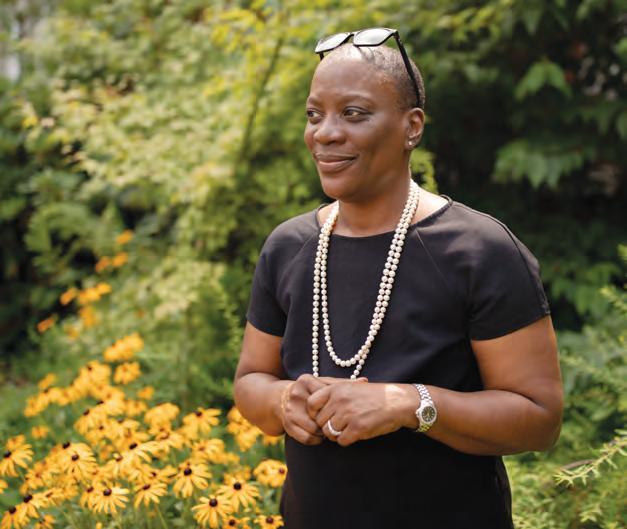
This summer, Reed welcomed Dr. Phyllis Esposito, who was appointed vice president and dean for institutional diversity after a national search.
In this role, Phyllis will help lead Reed’s efforts to foster an inclusive campus environment and meet the college’s commitments to diversity, equity, and anti-racism. She will be an integral member of President Audrey Bilger’s senior leadership team and a crucial adviser for others across the college in the collective work to become a more inclusive community.
Phyllis has extensive experience creating and executing initiatives to advance diversity, equity, and inclusion across campuses, and throughout her career she has prioritized collaboration with others in support of these plans and programs. She comes to Reed from Everett Community College in Everett, Washington. Before joining EvCC in 2020, she worked as director of the Center for Multicultural Education and as the interim dean of the School of Integrative Studies at Edgewood College in Madison, Wisconsin. Earlier in her career, Phyllis was a member of the faculty at Evergreen State College in Olympia, Washington. She earned her bachelor’s degree in elementary education, a master’s degree in integrated humanities and education from Rockhurst University, and her doctorate in curriculum and instruction from the University of Kansas.
“My hope for the work ahead is to build upon the great work of the OID team,” Dr. Esposito said, “with special appreciation to Tony Boston [interim dean for institutional diversity] and Mary James [physics; dean for institutional diversity 2014–21] for establishing a solid foundation. My vision is to work in collaboration with students, faculty, and staff supportive of a campus community where one can bring one’s authentic self and feel a sense of academic and social belonging.”
NEWLY TENURED FACULTY BRING IDEAS AND INNOVATION TO REED
BY ANNA JOHNSON
The board of trustees awarded tenure to remarkable Reed professors in 2021 and 2022.
With an impressive array of accolades, awards, and grants, these professors epitomize the college’s dedication to scholarly pursuit, critical thinking, and creativity. Their commitment to student success is evident in their outstanding work in the classroom, lab, and field.
“I am delighted for the college and for these faculty members,” said Prof. Kathy Oleson [psychology], the dean of the faculty. “They are true teacher-scholars—they are not only contributing in impressive ways to their academic fields but also, and more importantly, they are fantastic teachers who are transforming Reed students’ lives. With this new class of tenured faculty, Reed is in good hands.”
2021 TENURE APPOINTMENTS
Prof. Betsey Behr Brada
Anthropology
Betsey Behr Brada is a cultural anthropologist specializing in health and medicine in southern Africa. Her upcoming book, Learning to Save the World: Global Health Pedagogies and Fantasies of Transformation in Botswana, relies on fieldwork gathered during Botswana’s HIV/ AIDS epidemic. The years of ethnographic data informing this manuscript also resulted in an American Ethnologist article that won her the 2013 Clark Taylor Paper Prize. She earned her PhD in 2011 from the University of Chicago.
Prof. Kelly Chacón
Chemistry
Kelly Chacón was recently recognized by the American Chemical Society as a trailblazer among LGBTQ+ chemists. They are a current Henry Dreyfus Teacher Scholar Award nominee, were awarded the Ed Stiefel Early Investigator Award, and received the National Science Foundation’s most prestigious award for pretenure faculty. These and other awards have been a huge boon for their metal ion research. Chacón has leveraged their success as a teacher and researcher to make space for students of all identities to thrive in chemistry.
Prof. Victoria Fortuna
Dance
Victoria Fortuna launched the innovative Community Dance at Reed project in 2015. Her recent book, Moving Otherwise: Dance, Violence, and Memory in Buenos Aires, won the de la Torre Bueno First Book Award from the Dance Studies Association, and she recently coedited a special section of Theatre History Studies titled “Commingled Histories: Theatre & Dance.” Fortuna has received grants and awards from Fulbright, the Society of Dance History Scholars, and the Latin American Studies Association, among others. Her PhD in performance studies is from Northwestern University.
Prof. Tom Landvatter
Greek Latin, and Ancient Mediterranean Studies; and Humanities Tom Landvatter’s research focuses on the archaeology of death, burial, and imperialism, and has been supported by the National Science Foundation and a Fulbright award. He has excavated ancient history at archaeological dig sites around the world. He is currently codirector of the Pyla-Kousopetria Archaeological Project’s (PKAP) excavations at the site of Vigla, Cyprus, a rare Hellenistic fortification. The project’s archaeological field school has proved to be fertile ground for intrepid Reedies since 2018. He holds a PhD in classical art and archaeology from the University of Michigan.
Prof. Mónica López Lerma
Spanish
With degrees in film, literature, and law, Mónica López Lerma designs and teaches a variety of interdisciplinary courses at Reed in Spanish and the humanities. She is the author of the 2021 book Sensing Justice through Contemporary Spanish Cinema: Aesthetics, Politics, Law. In addition, she was the editor-in-chief of No-Foundations: An Interdisciplinary Journal of Law from 20122017 and currently sits on its editorial board. Her PhD is in Comparative Literature from the University of Michigan, but her two law degrees have allowed her to teach at law schools in Finland, Canada, and Kyrgyzstan.
Prof. LaShandra Sullivan
Anthropology
LaShandra Sullivan is an anthropologist who came to Reed in 2016 and has made an impact on campus by serving on several Reed committees, cultivating discussion through the Comparative Race and Ethnicity Studies (CRES) Colloquium, hosting high-caliber guest lecturers, and excelling in engagement with students. She conducts ethnographic fieldwork on the ground in Rio de Janeiro and in the state of Mato Grosso do Sul. The latter informed both her dissertation and a forthcoming book, Unsettling Agribusiness: Indigenous Land Struggle in CenterWest Brazil. Her PhD in anthropology is from the University of Chicago.
2022 TENURE APPOINTMENTS
Prof. Mir Bowring
Chemistry
Mir Bowring is an organometallic chemist whose research program, funded most recently by a grant from the American Chemical Society, reveals the invisible
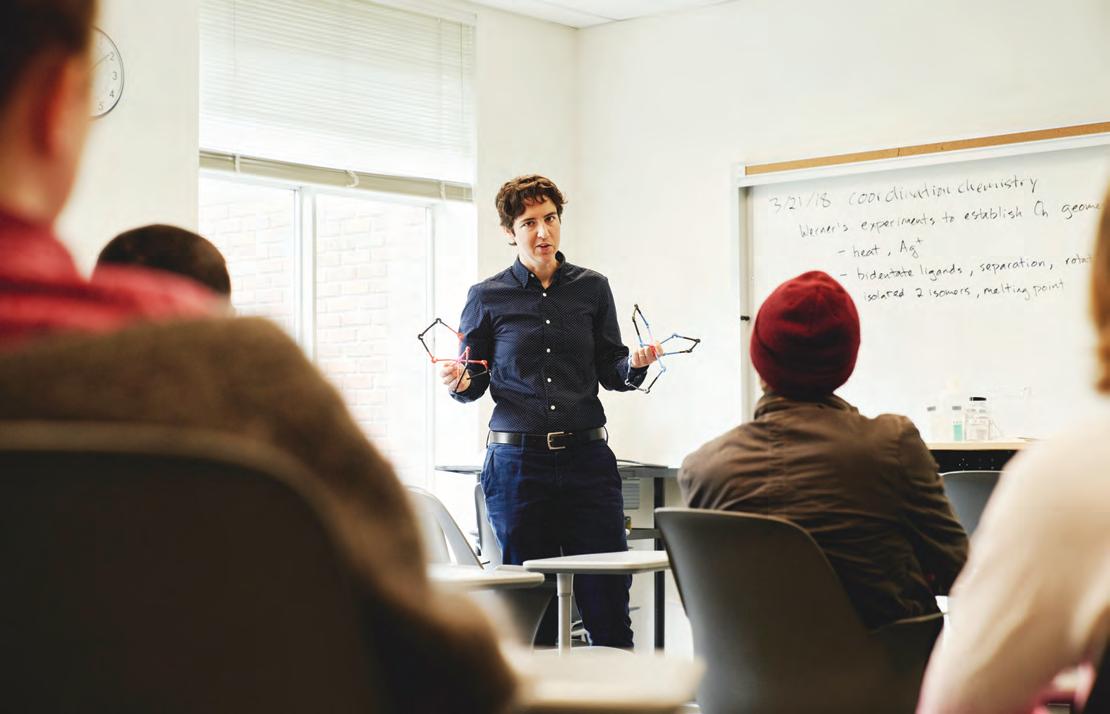
Prof. Mir Bowring [chemistry] uses molecular models of chiral cobalt complexes to illustrate the origins of the field of coordination chemistry.
mechanisms of chemical reactions with applications in producing greener fuels like hydrogen.
Bowring has recently published papers with Reed undergraduate coauthors on airfree glassware and on large isotope effects in organometallic chemistry, and their inorganic chemistry class participates in their research on reclaiming palladium from road dust. Bowring earned a BS in chemistry from Yale University before working as a high school chemistry teacher. They went on to earn a PhD from UC Berkeley and completed postdoctoral training at the University of Washington and Yale University.
Prof. Sam Fey
Biology
Sam Fey is an ecologist who studies how populations and communities respond to, and are shaped by, environmental variation. Most of his research involves aquatic organisms, including fish, crustacean zooplankton, and phytoplankton. His research is supported by the National Science Foundation and has incorporated efforts of Reed College students who work in both lab and field settings. He earned an Ecology and Evolutionary Biology PhD from Dartmouth College before working as a postdoctoral fellow in the Department of Ecology and Evolutionary Biology at Yale University. Since 2017, Sam has published 17 peer-reviewed articles involving 8 different Reed student co-authors.
Prof. Radhika Natarajan
History
Prof. Radhika Natarajan is a historian of modern imperial Britain whose article “Performing Multiculturalism: The Commonwealth Arts Festival of 1965” was published by the Journal of British Studies. Her monograph Empire and the Origins of Multiculturalism examines engagements between social workers and migrants to Britain from the decolonizing empire and will be published by Oxford University Press. In addition, she is coauthoring an introduction to imperialism with John Munro for Columbia University Press, as well as writing a children’s history of the British Empire.
She obtained her PhD from UC Berkeley. Her scholarship and pedagogy incorporate the experiences of colonial subjects in order to both expand the range of actors and activity in the imperial past and to show how contemporary inequalities have been structured by colonialism.
Prof. Michelle Wang
Art History Michelle Wang holds a PhD from the University of California, Berkeley, and came to Reed as an assistant professor of art history and humanities in 2015. At Reed she broadens students’ understanding of the art and archaeology of tenth-century BCE to third-century CE China, with an emphasis on early notational systems. Prof. Wang’s research interests include artisanal practice, history of technology, excavated texts, and mortuary culture. Her current book project reflects her interest in material culture and explores the multifaceted nature of early Chinese maps.







